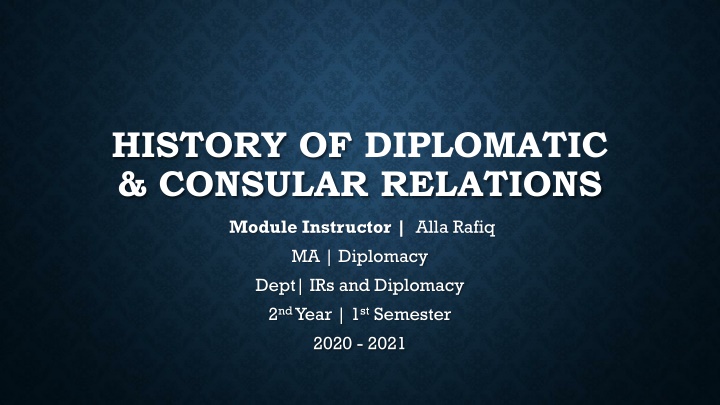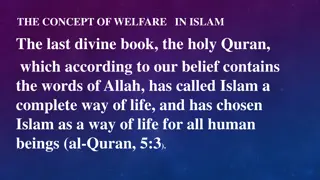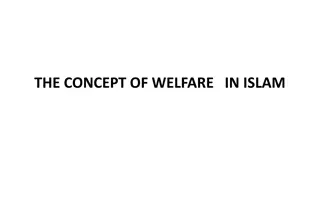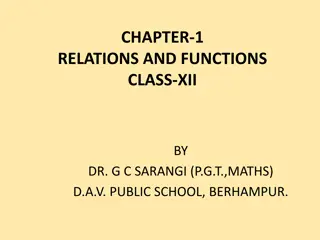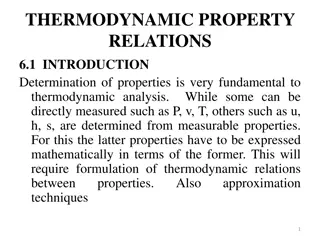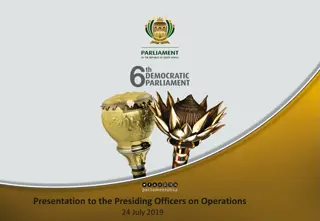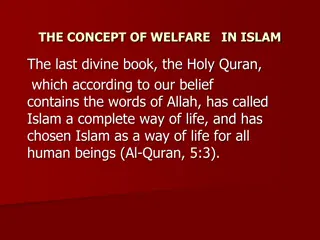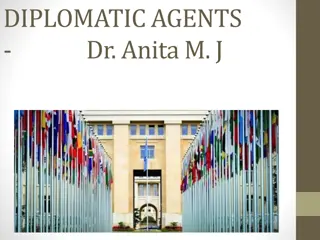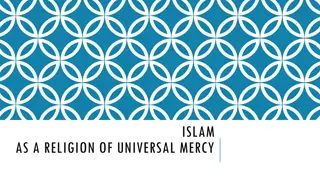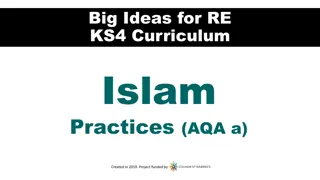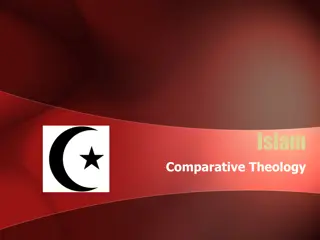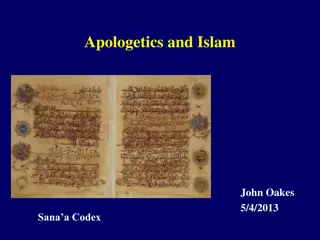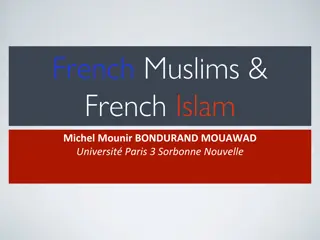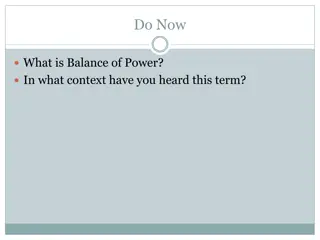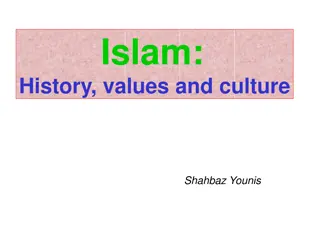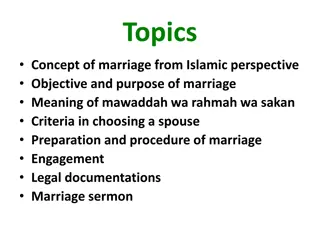History of Diplomatic Relations in Islam
The practice of diplomacy in Islam from the times of Prophet Muhammad to the Ottoman Empire. Discover the principles, influences, and general traits of Islamic diplomacy in international relations
Download Presentation

Please find below an Image/Link to download the presentation.
The content on the website is provided AS IS for your information and personal use only. It may not be sold, licensed, or shared on other websites without obtaining consent from the author.If you encounter any issues during the download, it is possible that the publisher has removed the file from their server.
You are allowed to download the files provided on this website for personal or commercial use, subject to the condition that they are used lawfully. All files are the property of their respective owners.
The content on the website is provided AS IS for your information and personal use only. It may not be sold, licensed, or shared on other websites without obtaining consent from the author.
E N D
Presentation Transcript
HISTORY OF DIPLOMATIC & CONSULAR RELATIONS Module Instructor | Alla Rafiq MA | Diplomacy Dept| IRs and Diplomacy 2ndYear | 1stSemester 2020 - 2021
LECTURE | 6 History of DIPLOMACY In the Medieval Ages; Diplomacy in Islam
AGENDA OF THE LECTURE Student's Seminar by; Zahra Khalid Purpose and Nature of Diplomacy Topic of the lecture : Diplomacy in Islam
KEY WORDS Islam| | prophet |Charter |Provisions | Caliphs | Dynasty | Hostilities |P.B.U.H | WAFD | SAFIR | SAFARA | Tolerance | Justice | Privilege |Courtesy | Honor
DIPLOMACY IN ISLAM Diplomatic interaction, practiced in Islam right from the periods of: Prophet Muhammad (SAW); the first four Caliphs; the Umayyad dynasty; the Abbasid Empire; the Ottoman Empire to present
One of the oldest ways of solving disputes among human beings peacefully has been the diplomatic negotiation. Diplomacy is one of the most practical and dynamic topics of international relations; therefore, the religion of Islam since its beginning, has recognized this logical approach as one of the most important ways for conducting international affairs through ambassadors and envoys who use peaceful means.
Islamic Diplomacy Influenced by Arab cultural values & recognized international laws. Individual & State conduct primarily Based on 2 sources: Al-Quran Prophet s Hadis (p.b.u.h.)
General Traits of Arab Foreign Relations During the Prophet Days Basic rules guided relation between Muslims & other people: SALAM Recognized other States rights to exist & independence/sovereignty In self-defense, Muslims allowed to fight back, but not to initiate hostilities.
Diplomatic System & Institution Diplomatic Agents: Ambassador is known: SAFIR A delegation of diplomatic representative: WAFD Envoys present letter of credentials to host States e.g. Prophet s cousin, Jaafar, to Negus of Abyssinia
Exchanging envoys/diplomatic agents, such as; 1. e.g. Harun Al-Rashid exchanged with Charlemagne both envoys & gifts. 2. Saad bin Abi Waqqas (conqueror of Persia) was the first envoy to China.
Quranic verse describes exchange of envoys between the prophet Sulaiman (Solomon) & Bilqis, Queen of Sheba (992-952 B.C.). Surah al-Naml (27:23-44)
Criteria of Selecting Diplomatic Officers from Islamic Perspective Selection of ambassadors based on: Capability Trustworthiness Nizam Al-Mulk in his 'Siyasat Nama' (the Book of Politics) suggested : Bold' in speaking but does not say too much; Traveled widely; A portion of every branch of learning; Retentive of memory & far-seeing;
Embassies (Safarah) No resident embassies. Envoy/delegation could be dispatched for a particular mission & return back as soon as mission accomplished. e.g. Prophet sent envoys: Other Arab tribes. Abyssinian Negus. Monarchs of Persia and Byzantium.
Negotiation Diplomatic procedure in which State representatives in direct personal contact or through correspondence, Engage in discussion of matters of mutual concern, Attempt to resolve disputes arisen between them. Main objectives is to reach an agreement, whether based on a treaty or on mutual understanding.
4 Steps to be Implemented to Reach an Agreement with Another Party Preliminary negotiation Negotiating & composing treaty text. Concluding an agreement by signing it & recording by witnesses. Process of finalizing an agreement: ratification.
Diplomatic Immunity in ISLAM There are religious texts in the holy Qur'an and in the Sunnah of the Prophet that cares and encourages diplomatic immunities. The origin of the principle of diplomatic immunity in Islam is the maxim which is actually word of the holy Prophet that says (do no harm). What is Diplomatic Immunity In Islam? Immunity that was established by the Prophet (SAW) is that an envoy should not be killed. Instead, envoy must be allowed to return safely, whether the other party accept or reject the message that he brought.
during the negotiation Prophet upheld the principle of tolerance, justice and patience. diplomatic procedures were adopted in Islamic history as a means of spreading the word of Islam.
Diplomatic Immunity Al-Quran & Sunnah & consistent practice of Muslim leaders established privileges & immunities of diplomatic agents. Diplomatic agents entitled to: Immunity from prosecution, Freedom from arbitrary arrest & detention Proper care & treatment.
Aman Basis of immunities & privileges: Aman (safe conduct) Given to diplomatic agents who sought safe entry into a Muslim country. Aman legally binding privilege that obligates a State to protect the beneficiary until his departure from its territory. State may revoke Aman & expel the beneficiary The only limitation on this freedom was the act of spying.
Diplomatic Privileges Muslim rulers received foreign envoys with courtesy& honor. ambassadors are monarch s representatives & they should be treated as such. Diplomatic envoys exempted from taxes Goods carried by the envoy for commercial purposes subjected to taxation. e.g. Abu Yousuf, well known Islamic legislator in the Abbaside period, stated that an envoy who brought materials for trading would pay 1/10 tax after conducting the sale..
EXAMPLE OF TREATY IN ISLAM Charter of Medina, Prophet Muhammad attempted to negotiate with all these people of Medina and the Jews, and later the negotiation had been documented which is known as Constitution of Medina . It is a document of great historical significance. The provisions of the Treaty itself really showed the credibility of Prophet Muhammad as diplomat.
The texts of Quran represent; the greatest respect for the human dignities; it provides him with everything that will preserve him the dignity,such as; personal immunity, privileges, virtue and many examples that we shall see in dealing of the holy Prophet. The prophet established and affirmed the fundamentals,and which was continued after him by the rightly guided Caliphs.
Treaty of Hudaibiyah; In this Treaty prophet really exhibited to Muslims the real art of negotiation. As a peace-oriented diplomat Prophet Muhammad preserved peace and offered negotiation even when his attention to enter Mecca was denied by the Quraisyh.
Thank You Q & A
Bibliography: Thierry Balzacq & Fr d ric Charillon, Global Diplomacy An Introduction to Theory and Practice, Translated: William Snow, Palgrave Macmillan, 2020. Sally Marks Chas. W. Freeman, Diplomacy, Encyclopaedia Britannica, Inc. Jan 17th, 2019. https://www.britannica.com/topic/diplomacy Arshid I. Dar and Jamsheed A. Sayed, Diplomacy in ISLAM, Asian Journal of Science and Technology Vol. 08, Issue, 09, pp.5616-5618, September, 2017. Dr. Dana Barzinji, An Introduction to Contemporary Diplomatic and Consular Relations, Zahawi Center, No. 56. 1stEdtition, 2017.
